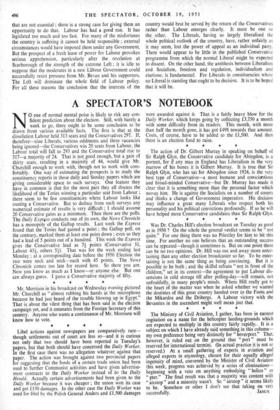A SPECTATOR'S NOTEBOOK N O one of normal mental poise is
likely to risk any con- fident prediction about the election. Still, with barely a week to go, there ought to be some conclusion to be drawn from various available facts. The first is that at the dissolution Labour held 313 seats and the Conservatives 297. If, therefore—nine Liberals, various oddments and three vacancies being ignored—the Conservatives win 20 seats from Labour, the Labour total will fall to 293 and the Conservative total rise to 317—a majority of 24. That is not good enough, but a gain of thirty seats, resulting in a majority of 44, would give Mr. -Churchill enough to work with, though not to work with com- fortably. One way of estimating the prospects is to study the constituency reports in those daily and Sunday papers which are giving considerable space to such surveys. One feature they have in common is that for the most part they all discuss the likelihood of the Tories winning a particular seat from Labour ; there seem to be few constituencies where Labour looks like ousting a Conservative. But to deduce from such surveys any numerical estimate of results is very difficult ; I should assume 20 Conservative gains as a minimum. Then there are the polls. The Daily Express conducts one of its own, the News Chronicle has a monopoly of the Gallup results. Last week the Express found that the Tories had gained a point ; the Gallup poll, on the contrary, marked them at least one point down ; even so they had a lead of 5 points out of a hundred. This week the Express gives the Conservative lead as 71 points (Conservative 51, Labour 431, others 51). That was for the week ending last Monday ; at a corresponding date before the 1950 Election the two were neck and neck—each with 45 points. The News Chronicle comes too late for record here. So there you are. Now you know as much as I know—or anyone else. But one can always guess. I guess a Conservative majority of fifty.


































 Previous page
Previous page